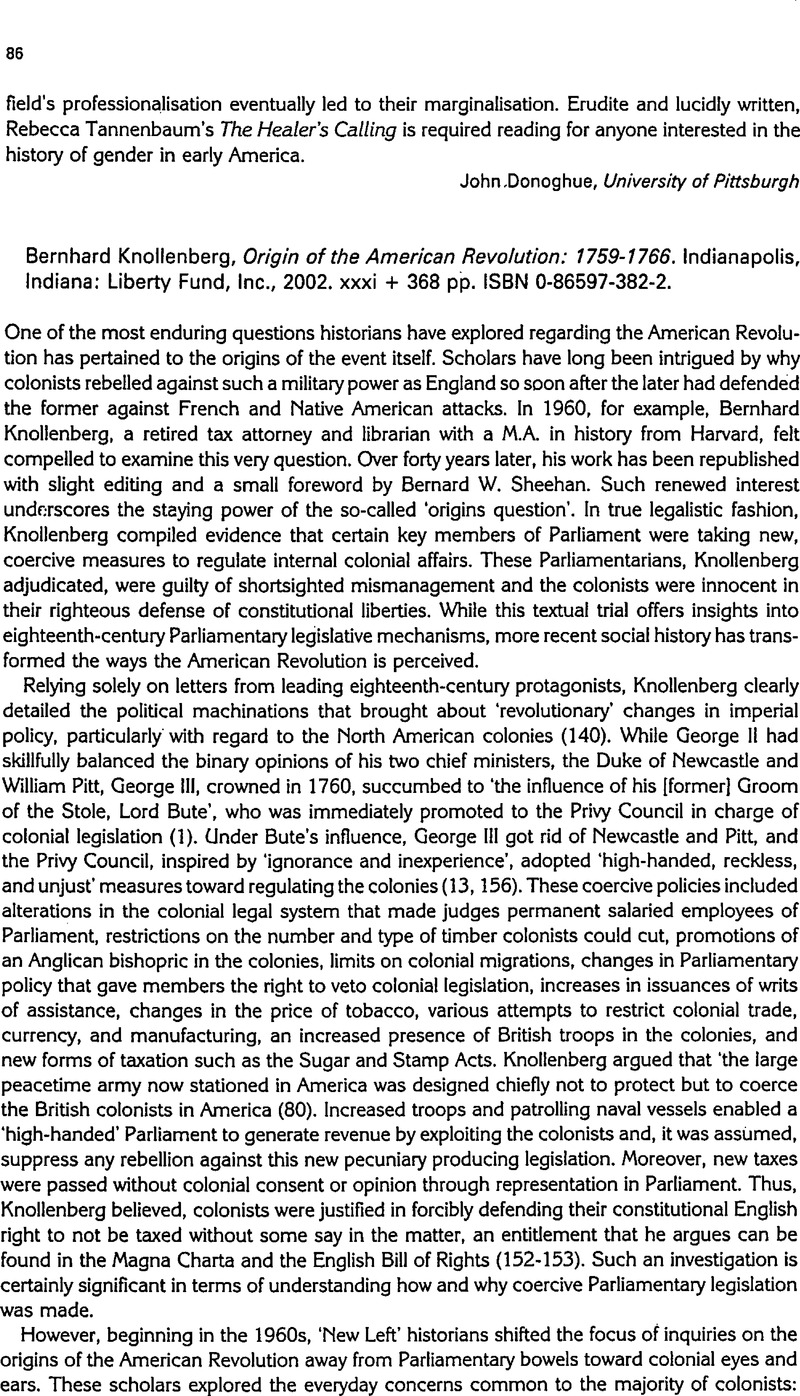No CrossRef data available.
Article contents
Bernhard Knollenberg, Origin of the American Revolution: 1759-1766. Indianapolis, Indiana: Liberty Fund, Inc., 2002. xxxi + 368 pp. ISBN 0-86597-382-2.
Published online by Cambridge University Press: 22 June 2011
Abstract

- Type
- Book Reviews
- Information
- Copyright
- Copyright © Research Institute for History, Leiden University 2004
References
Notes
1 Nash, Gary, Quakers and Politics: Pennsylvania, 1681-1726 (Princeton University Press, 1968)Google Scholar ; Young, Alfred, Dissent: Explorations in the History of American Radicalism (Northern Illinois University Press, 1968)Google Scholar ; Lemisch, Jesse, ‘Jack Tar in the Streets: Merchant Seamen in the Politics of Revolutionary America’, William and Mary Quarterly, 3rd Ser., No. 25 (1968) 371–407Google Scholar ; and Staughton, Lynd, Class Conflict, Slavery, and the United States Constitution (Indianapolis: Bobbs-Merrill, 1968)Google Scholar ; and Intellectual Origins of American Radicalism (New York: Pantheon Books, 1968)Google Scholar.
2 A few of the Progressives included Carl Lotus Becker. The History of Political Parties in the Province of New York, 1760-1776, 2nd ed. (Madison: University of Wisconsin Press, 1960)Google Scholar ; and Beard, Charles A., An Economic Interpretation of the Constitution of the United States, 3rd ed. (New York: The Free Press, 1941)Google Scholar.
3 Studies that have investigated Revolutionary soldiers' motivations for fighting with the express purpose of incorporating a new social historical approach include, Gross, Robert A., The Minutemen and Their World (New York: Hill and Wang, 1976)Google Scholar ; and Neimeyer, Charles Patrick, America Goes to War: A Social History of the Continental Army (New York: New York University Press, 1996)Google Scholar.
4 For an example of ‘new’ maritime history that focuses on maritime laborers' revolutionary participation, see Linebaugh, Peter and Rediker, Marcus, The Many-Headed Hydra: Sailors, Slaves, Commoners, and the Hidden History of the Revolutionary Atlantic (Boston: Beacon Press, 2000).Google Scholar
5 See, Nash, Gary B., The Urban Crucible: The Northern Seaports and the Origins of the American Revolution (Cambridge: Harvard University Press, 1979).CrossRefGoogle Scholar
6 See, Lemisch, Jesse, Jack Tar vs. John Bull: The Role of New York's Seamen in Precipitating the Revolution (New York: Garland Publishers, 1997).Google Scholar
7 For more on the interests of colonial women during the Revolutionary Era, see Applewhite, Harriet B. and Levy, Darlene G., eds, Women and Politics in the Age of the Democratic Revolution (Ann Arbor: The University of Michigan Press, 1990)Google Scholar ; and Kerber, Linda K., Women of the Republic: Intellect & Ideology in Revolutionary America (Chapel Hill: The University of North Carolina Press, 1980)Google Scholar.
8 For more on slaves' interests during the Revolutionary Era, see Frey, Sylvia R., Water From The Rock: Black Resistance in a Revolutionary Age (Princeton: Princeton University Press, 1991)Google Scholar ; Foner, Phillip, Blacks in theAmerican Revolution (Westport, Conn.: Greenwood Press, 1976)Google Scholar ; and Quarles, Benjamin, The Negro in the American Revolution (Chapel Hill: The University of North Carolina Press, 1961)Google Scholar.
9 See, for example, Bailyn, Bernard, The Ideological Origins of the American Revolution (Harvard University Press, 1967)Google Scholar ; The Peopling of British North America (New York: Vintage Books, 1988)Google Scholar ; and the follow-up Voyagers to the West: A Passage in the Peopling ofAmerica on the Eve of the Revolution (New York: Vintage Books, 1988)Google Scholar.
10 This famous quote was taken from Thompson, E.P., The Making of the English Working Class (London: Gollancz, 1963), 13.Google Scholar




